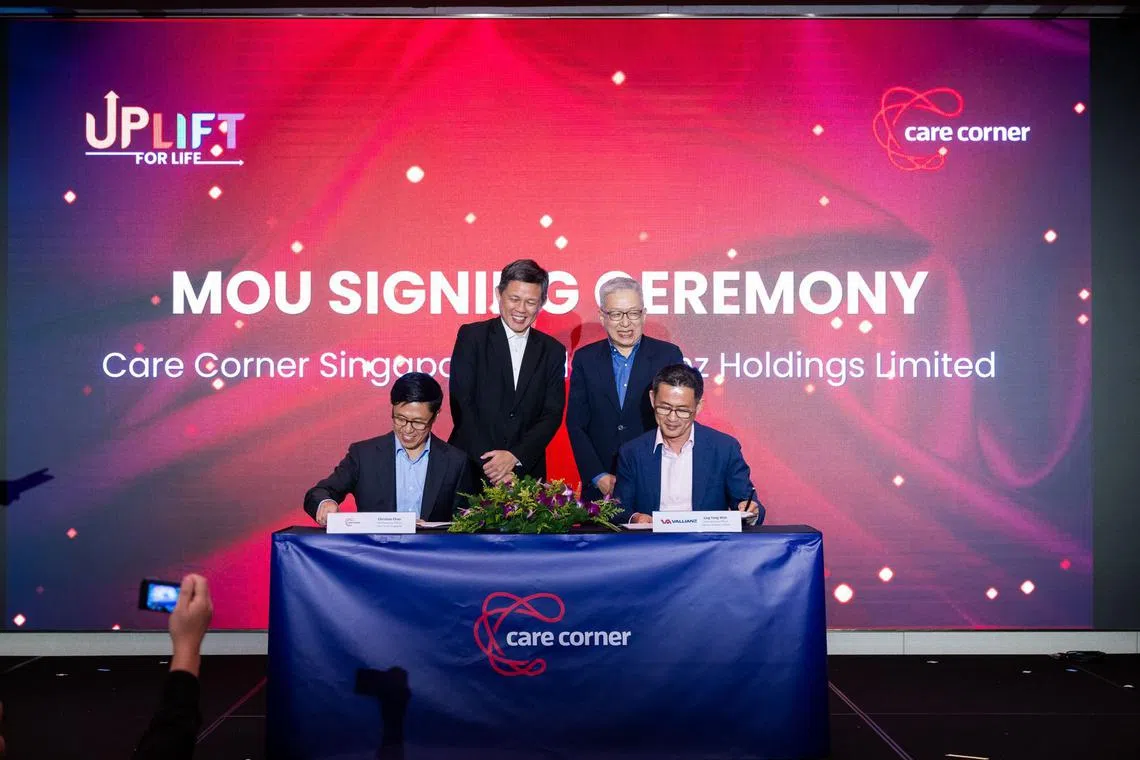UOL, Vallianz, STMicroelectronics commit S$700,000 to help special needs children, elderly at Care Corner
The three-year partnerships will use metrics including academic progress, developmental milestones to gauge success

CHARITY organisation Care Corner Singapore on Friday (Oct 11) announced three memorandums of understanding (MOUs) with STMicroelectronics, Vallianz and UOL Group, respectively.
The announcement was made at the charity’s biennial gala dinner at the Conrad Singapore Orchard hotel, where Minister for Education Chan Chun Sing was the guest of honour.
Through its MOU with UOL, Care Corner will subsidise learning and special needs support for more children from low-income families.
Meanwhile, Vallianz and STMicroelectronics will support the charity’s hot meals and frailty management programmes, respectively, focusing on issues such as nutrition and social isolation among the elderly.
The partnerships represent a combined commitment of more than S$700,000 over the next three years. Liam Wee Sin, group chief executive of UOL and Ling Yong Wah, CEO of Vallianz, were at the gala to witness the signing of the MOUs.
Care Corner’s CEO Christian Chao said: “Children and seniors are two critical demographics that require long-term support… By addressing these needs, (the) partnerships allow us to tackle fundamental issues that impact the well-being of multiple generations within the community.”
Navigate Asia in
a new global order
Get the insights delivered to your inbox.
Impact across generations
Among the metrics that will indicate the success of the learning and special needs support programme are academic progress and developmental milestones.
Improvements in beneficiaries’ literacy and numeracy skills will also be tracked by educators and specialists through regular assessments. Another important measure is social-emotional development, which will be evaluated through feedback from both parents and teachers, focusing on improvements in social interactions and communication.
Liam Wee Sin, UOL’s group chief executive, said: “We believe in fostering a more inclusive society where every individual has the opportunity to thrive (and) have been sustaining our support towards Care Corner’s initiatives for disadvantaged children since 2018. Last year, we extended our commitment to help the elderly under its care so that they can remain active and age healthily.”
Meanwhile, the frailty management programme is designed with specific metrics to ensure seniors are improving their physical health and reducing their debility.
A key measurement is the clinical frailty score (CFS), which helps track a senior’s overall frailty status and ability to perform daily activities independently.
Chao said: “For example, we aim to enable frail seniors who start with a CFS of four, which indicates moderate frailty and difficulty in performing activities of daily living, to improve their score over time. The goal is to help them regain strength and mobility so they can conduct essential tasks like walking, dressing or preparing meals with less assistance.

“By regularly assessing their CFS, we can measure improvements in their physical capabilities and independence. We also measure social engagement, as this is a key factor in preventing isolation, which can exacerbate frailty.”
As for the hot meals programme, the number of seniors served by the initiative is tracked to indicate the reach and impact.
Chao highlighted that these programmes have the potential to create greater social impact because they focus on tackling root causes rather than just surface-level issues.
Chan concurred, noting that the work that many social service agencies do are not on a short-term basis, and that “many of the results will only come perhaps a generation later”.
“Our measure of success is … how many people we don’t need to help tomorrow,” he added.
He also said that having organisations such as Care Corner create space for innovation despite the government already funding the majority of the social sector. National-level schemes have to be comprehensive, but niche areas may still need to be supported.
Moreover, if the society is run based on just taxation and the giving business is nationalised, it makes it almost transactional – “and I am not sure that is the kind of society ... that we want”, Chan said.
Therefore, longevity in social initiatives is crucial, Chao said, particularly within the environment, social and governance framework. This is because many of the issues that the organisation aims to address – such as mental health challenges and social mobility and isolation – are entrenched and require sustained, long-term effort.
“For-profit companies bring not just financial resources but also expertise in areas such as innovation, scalability, and operational efficiency. Non-profits, on the other hand, offer deep insights into community needs, expertise in direct service provision, and longstanding relationships with the beneficiaries.”
He added: “Together, these strengths complement each other in a way that drives sustainable social impact. As we progress as a society, these cross-sector collaborations are essential for building a more inclusive, resilient future. Businesses are increasingly recognising that their success is intertwined with the well-being of the communities they serve.”
There was also a cheque presentation segment at the event, and UOB donated S$900,000 towards the children services and Circle of Care Consultancy Services to uplift those from disadvantaged backgrounds.
Decoding Asia newsletter: your guide to navigating Asia in a new global order. Sign up here to get Decoding Asia newsletter. Delivered to your inbox. Free.
Copyright SPH Media. All rights reserved.

